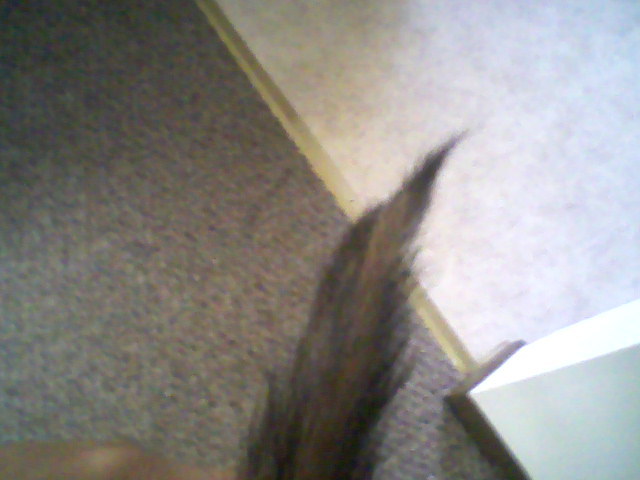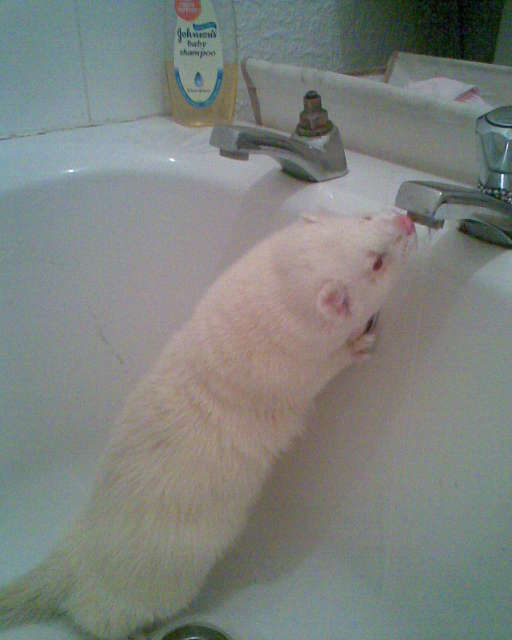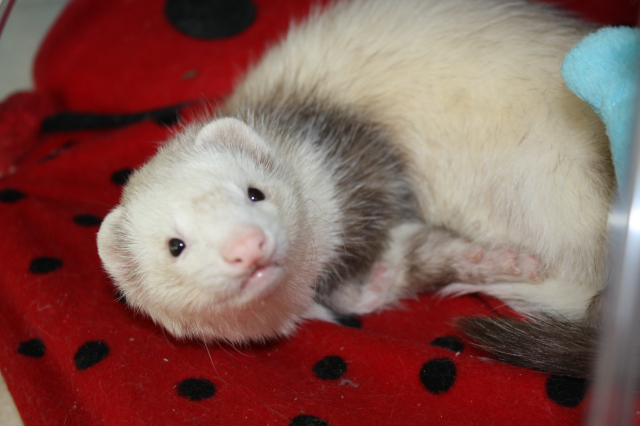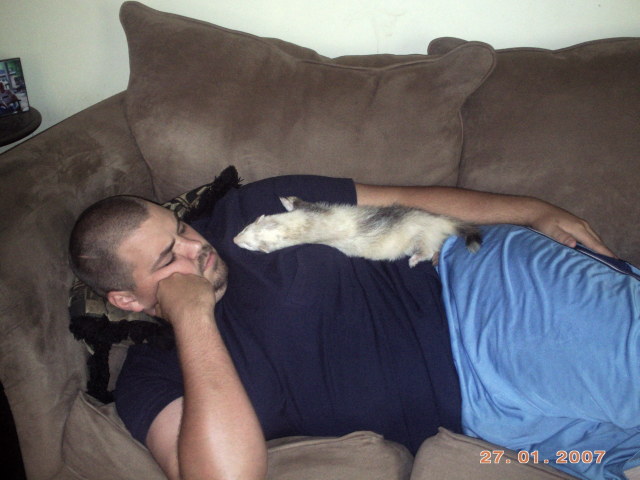QuestionI have already seen two vets specializing in ferret care to be as comprehensive as I can. I am leaving on a trip that cannot be cancelled and will probably be boarding him in the pet hospital until he recovers. My first vet x-rayed the ferret and found no foreign bodies and prescribed antibiotics for loose stool, advised me to keep an eye on him, and was nice enough to recommend a second opinion in case he missed anything. My second vet decided to run every test possible with my consent and discovered through ultrasound that he has more gas in the intestine than she had ever seen in her career, and blood test suggested it was highly possible he had contracted ECE. She prescribed two more medications including the popular amoxicillin and advised me to keep an eye on him as well, and to make sure he was hydrated and syringe feed him a/d diet as required to make sure he was eating. I personally do not know what to think because they seemed to discard his stool samples after feeling fairly certain their diagnosis is correct. I have not seen any green "slime" only alternating all liquid poop and completely black but not "tarry" poop, i.e. normally shape and consistency only completely black. I wish there was something I could do as the poor guy is constantly grinding his teeth and looks miserable, unless I am feeding him his medicine in which case he has the energy of his youth and fights vigorously. Is there anything I can do for him? I would really hate to go on my trip and get the call that he didn't make it, even though he seems to be responding to treatment for now. As you cannot diagnose I will simply have to trust the vets' decisions for now.
AnswerHello Peter,
Wow, you could not have better timing to ask me this question. My ferret is currently being treated for ECE as well. She began to show signs of diarrhea shortly after the introduction of a young ferret, which is a CLASSIC scenario. Has your ferret had any interactions with others? ECE, also known as Epizootic Catarrhal Enteritis, is caused by a virus and transmitted by the fecal-oral route. It can be carried on your clothing, but there HAS to be some contact with other ferrets somewhere for this disease to spread and it is HIGHLY contagious. Keep him separate from ALL your other ferrets. Cats/dogs/people CANNOT get ECE, but they can carry it on clothing/fur, so BE CAREFUL. Separating him will also help you to monitor him more closely to see if he is eating and his fecal output.
Young ferrets are often asymptomatic, or have a very mild case of diarrhea. Those 2 and under usually have mild-moderate symptoms which include watery mucoid diarrhea (not necessary green slime.. but there is almost always obvious mucous) anorexia and lethargy. These guys usually can recover on their own, but may need medical attention. Unfortunately, it is the older guys that get hit the hardest by this disease, as is the case with my 5 year old. They get SEVERE diarrhea that often progresses to a green mucoid "slime", anorexia, lethargy and progressively debilitating dehydration. Luckily WITH PROPER TREATMENT this disease is rarely fatal. The most dangerous part is the DEHYDRATION, and if managed properly, the ferret will likely recover.
The reason for the antibiotics is NOT to treat the ECE (a virus), but rather prevent any secondary bacterial infections. This is EXTREMELY important in ferrets, since they carry a bacteria in their intestines called Helicobacter. When the normal environment of the gut is altered, such as with ECE, this bacteria begins to grow, causing ulcers. A typical sign of GI ulcers is black tarry stool (caused by digested blood), anorexia, lethargy and teeth grinding from pain.
The typical ECE case requires 5 things for proper management.
1. Antibiotics to treat secondary infections. Amoxicillin and Metronidazole should both be used together to prevent a Helicobacter problem. The ferret must get over the virus on his own, and the antibiotics help to prevent any bacterial complications.
2. A stomach protectant to help prevent GI ulcers such as Carafate. Carafate MUST be give 15-20 mins BEFORE any steroids or FOOD. It coats the stomach and helps protect it.
3. A steroid such as Prednisolone. This will help reduce inflammation in the GI tract.
4. Feeding. If the ferret is NOT eating on his own, he must be FORCE FED. A/D works very well for this, and he should be fed small frequent meals. I fed 6 mls frequently of warm A/D with extra water added to it followed by 6 mls of water. You can use pedialyte instead of water, which can help with the dehydration (I found a comparable unflavored electrolyte solution at Rite Aid). Eventually she began to "like" her A/D mixture and now eats it ravenously on her own. I began to grind up her regular food and add that in too. I have noticed the plain A/D gives her a loose, dark brown stool. By adding some of her ground-up regular diet, it seemed to firm up a bit, but it is still a bit loose and dark. It is not black though. It makes me suspicious your ferret may have GI bleeding from an ulcer, especially since he is grinding his teeth AND has a very dark black stool.
5. HYDRATION. HYDRATION. HYDRATION. This is THE MOST IMPORTANT PART of helping your ferret though ECE. If he is too dehydrated, he MUST be hospitalized and placed on IV fluids. If you are able, your vet MAY let you try administering fluids under the skin (subcutaneously) 1-3 x a day instead. This requires sticking a needle in a wiggling ferret, which is NOT something every owner can do. Monitoring hydration is EXTREMELY important. Normally, his scruff should "snap" back in to place when pinched and pulled up a bit, his gums should be moist, and his eyes should not seem "sunken". If you notice the scruff does not snap back, the gums are tacky or sunken eyes, he is very dehydrated which can be DANGEROUS. If you notice this, have him seen ASAP for IV fluids.
Who is watching your ferret while you are away? I would recommend to keep him at the vet clinic if possible or find someone knowledgeable with ferrets/ECE. You could even ask if any of the techs at the vet clinic may be interested in ferret-sitting him. Not only do they know what signs to watch out for, but they can contact the doctor immediately if anything goes wrong. I have been an emergency tech for quite a few years and have pet-sat critical cases such as these while the owners were away.
Please let me know if you have any other questions. I would be more than happy to answer them.
-Cindy P

 balding tail
QuestionQUESTION: The ferret I am talking about is one
balding tail
QuestionQUESTION: The ferret I am talking about is one
 ferret love
Question
snert
hi my name is john from england i had to
ferret love
Question
snert
hi my name is john from england i had to
 odd shedding pattern
Questionferret
QUESTION: Hi Jacquie,
I have a q
odd shedding pattern
Questionferret
QUESTION: Hi Jacquie,
I have a q
 Shes so nippy
Question
Delilah
My boyfriend got me the cutest
Shes so nippy
Question
Delilah
My boyfriend got me the cutest
 Crazy Ferret
Question
Tweedle and Drew
My son brought home a ferret
Crazy Ferret
Question
Tweedle and Drew
My son brought home a ferret